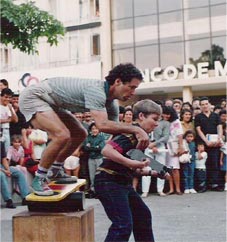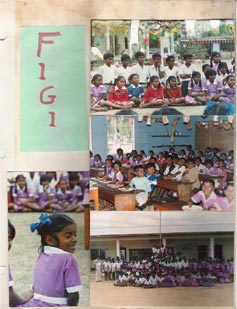Where the idea come from:
When I was in my early 20’s I packed my things into my 1966 Chevy Malibu, asked my girlfriend to join me, and set out for central america. I was unsure of what I would find, what would find me, or where I would be in the next couple months.
 It was 1985, I had been performing on the streets of the west coast for some time- although I still considered myself a hobby performer, I was becoming more comfortable with my skills and was ready for an adventure to see how far such talents could take me. I began performing my show in local markets and squares of small towns. It seemed that there was never a lack of warm, kind hearted locals to appreciate my desire to entertain. In such a mall town I performed a Harpo Marx influenced show (complete with horn). When the show had concluded, the audience began to surround me, a sea of smiles and questions in a language that was too beautiful for me to understand at the time. One such smile that came with a voice asked me in english, “Why do you come here, to our village? You bring so much happiness....” The woman’s question remained in my head for many years, perhaps because I had no answer, perhaps because I was beginning to realize the potential that rest in my abilities. I carried these feelings with me back to Eugene, Oregon where I had begun to establish a family of other street performers whom I would share these these feelings with.
It was 1985, I had been performing on the streets of the west coast for some time- although I still considered myself a hobby performer, I was becoming more comfortable with my skills and was ready for an adventure to see how far such talents could take me. I began performing my show in local markets and squares of small towns. It seemed that there was never a lack of warm, kind hearted locals to appreciate my desire to entertain. In such a mall town I performed a Harpo Marx influenced show (complete with horn). When the show had concluded, the audience began to surround me, a sea of smiles and questions in a language that was too beautiful for me to understand at the time. One such smile that came with a voice asked me in english, “Why do you come here, to our village? You bring so much happiness....” The woman’s question remained in my head for many years, perhaps because I had no answer, perhaps because I was beginning to realize the potential that rest in my abilities. I carried these feelings with me back to Eugene, Oregon where I had begun to establish a family of other street performers whom I would share these these feelings with.
It was with this family and at this time that I saw a film called "Bye, Bye, Brazil" which will always stick out in my mind as one of the most beautiful films I have ever seen. “Bye, Bye, Brazil” will always remain an extremely influential film to me. Before long I had grown anxious to get back on the road, and so I traveled south to Baja, California. I began to preform at schools in Baja, by speaking with headmasters of schools. In one particular case my offer to perform a free show prompted the principal to gather the 600 students on the spot and begin the show right there and then. My next stop was in Cabo San Lucas where I performed a lively show in a disco. To my great amazement I found that I made enough of an impact to be featured in a local magazine.
 By 1986 I had begun to travel overseas. I had made my way to Australia, New Zealand, and then Fiji. While on Fiji there was a coup: a one Colonel Rabuka had taken over the country by force, and instilled martial law. Although others may have been less inclined to continue street shows, I was more than ready for the experience. I had set up a show and began to draw a crowd when a large Fijian Police officer stepped in and impeded any possibility of continuing. Immediately following the shut down of the show I was approached by a local lawyer who offered to buy me lunch. As we sat and talked I decided to offer my services and provide a free show for a local Indian school. After a warm reception I wanted to perform at more local schools and so arranged another free performance at a Fijian school. It was quite the experience to see how the two different cultures, who have been cohabiting for generations, were dealing with the political situation. The coup in Fiji led by Colonel Rabuka,was in response to the loss of majority rule by the Fijians, as the Indian seats in Parliament were on a steady rise. This was certainly a time of social and economic strife, and many Indians who were being persecuted fled the country in fear of the violence.
By 1986 I had begun to travel overseas. I had made my way to Australia, New Zealand, and then Fiji. While on Fiji there was a coup: a one Colonel Rabuka had taken over the country by force, and instilled martial law. Although others may have been less inclined to continue street shows, I was more than ready for the experience. I had set up a show and began to draw a crowd when a large Fijian Police officer stepped in and impeded any possibility of continuing. Immediately following the shut down of the show I was approached by a local lawyer who offered to buy me lunch. As we sat and talked I decided to offer my services and provide a free show for a local Indian school. After a warm reception I wanted to perform at more local schools and so arranged another free performance at a Fijian school. It was quite the experience to see how the two different cultures, who have been cohabiting for generations, were dealing with the political situation. The coup in Fiji led by Colonel Rabuka,was in response to the loss of majority rule by the Fijians, as the Indian seats in Parliament were on a steady rise. This was certainly a time of social and economic strife, and many Indians who were being persecuted fled the country in fear of the violence.
I moved along, I found myself with a rental car, a good amount of kava root, and undiscovered roads that led to the interior of the island. Along these roads I came across and old man and his son, who were traveling by horseback. After a short conversation the man took me to visit his village, but first I was to meet the Chief. Inside a huge lodge that painted me an ant on a log, I sat waiting for the chief. When the man returned with the chief, I handed the kava root to him. The man looked quickly at the root then handed it off to the chief, who took a longer look, a more investigative look, and then a satisfied look. When the chief spoke I sat in wonder at the meaning of his stoic words. The gentleman that I had met on horseback with his sone then translated to me that the chief had said, “You are welcome here, in our village, you may go where you choose, and you are our guest...” I made my way from the lodge where I had met the chief to an open field where I took out a Fris-bee that I had brought with me. After just a few throws, nearly half the village was running here and there to get their hands on the Fris-bee, and their chance to throw it. The game ran for some time, and as the sun began to set I couldn’t help but to have an overwhelming sense of happiness. By night fall, all the villagers had made their way to their respective huts, and I was invited into the mens hut to enjoy some kava. We talked long into the night, mostly of the political disturbances still in full motion in the cities. It seemed as though the coup did not have a great impact on the villagers. Some had economic ties to the city, but by and large the villagers had no feelings towards what their city dwelling brothers were facing.
Years later I met my wife Ina, who I am now divorced from. The divorce was extremely painful, and remains so to this day. It was excruciating watching my family unit dissolve. It only exsanguinated my heart more, that we had two children together, Roze and Toby. In the early years of our marriage, we took our son on a trip to Venezuela, where I performed as I had before in Mexico, Fiji, Australia, and New Zealand. I would perform street shows in order to support my young family, but as before I felt the desire to donate my skills and time to local schools. On Margarita Island I had the opportunity to perform at a school and again the locals received me with the kindest of hearts. The only difference between this experience and ones past was the hospitality and warmth was extended to my family.
